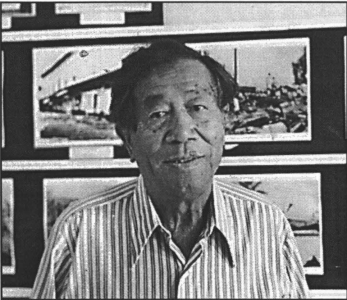Robert Y.S. Steamy Chow

Tsunamis Remembered: Oral Histories of Survivors and Observers in Hawai‘i
Life history interviews with individuals who witnessed and survived tsunamis-particularly the 1946 and 1960 disasters on the Big Island of Hawai'i. Thirty individuals-mostly residents of Hilo and Laupahoehoe-recall their experiences before; during, and after the 1946 and 1960 tsunamis which were arguably the most destructive natural disasters in modem Hawaiian history.
Robert "Steamy" Chow, a retired Hilo police officer, was born March 19, 1922. He is the flfth of seven children born to Keong Chow, an immigrant from Canton, China, and Honolulu-born Violet K.F. Fong Chow. Chow spent much of his boyhood selling newspapers and shining shoes on street comers in downtown Hilo, and helping in his father's shoe repair business. He was educated in Hilo schools and graduated from Hilo High School in 1940. Upon graduation, Chow worked for the Hilo Tribune-Herald. After a brief military stint, he returned to Hilo and began his twenty-one-year career in the Hilo Police Department. An injury forced him to retire from the police force in 1964. Between 1965 and 1983, Chow was an insurance adjuster. Since 1990, Chow has been the manager of the Historic Kress Building, where he oversees an eatery, movie theater complex, and special events held in the former department store building on Kamehameha Avenue. The building survived the 1946 and 1960 tsunamis. Chow's three oral history interviews were conducted in his downtown Hilo office, where he recalled his eyewitness experiences as a police officer assigned to the downtown beat during the 1946, 1952, 1957, and 1960 tsunamis. Very knowledgeable about Hilo's history and people, Chow is an original steering committee member of the Pacific Tsunami Museum, where he serves as a docent. He is often called on to present talks to students and community organizations about the background and dangers of tsunamis. He lives in Hilo with his wife, Lily Lui-Aki Chow. The couple raised two sons.
Scope and Content Note
A Hilo-born retired police officer describes his parents' background, father's shoe repair shop, childhood jobs selling newspapers and shining shoes, downtown Hilo neighborhood, toys and games, and Hilo Union School education. He talks about the military presence on the Big Island following the Pearl Harbor attack and the interaction of military and civilian police. The 1946 tsunami is detailed in a street-by-street and wave-by-wave sequence of events. His duties included identifying bodies, surveying the damage, and helping in the cleanup. He also covers the 1960 tsunami with another street-by-street description of wave action, damages, and cleanup. He reflects on his philosophy of helping people which stemmed from the 1946 tsunami, tsunami education, and Pacific Tsunami Museum founding and volunteer work.
Program Note:
This interview is part of the Center for Oral History's project Tsunamis Remembered: Oral Histories of Survivors and Observers in Hawai‘i. Interviews from this project are available in the Center's ScholarSpace open access repository.
The Center for Oral History (COH), in the Department of Ethnic Studies at the University of Hawaiʻi at Mānoa, collects, documents, preserves and highlights the recollections of Native Hawaiians and the multi-ethnic people of Hawaiʻi. It produces oral histories and interpretive historical materials about lifeways, key historic events, social movements and Hawaiʻi’s role in the globalizing world, for the widest possible use.
Please Note: The oral histories in this collection are protected by copyright and have been created for educational, research and personal use as described by the Fair Use Doctrine in the U.S. Copyright law. Please reach out Voices@noaa.gov to let us know how these interviews are being used in your research, project, exhibit, etc. The Voices staff can help provide other useful resources related to your inquiry.
The NOAA mission is to understand and predict changes in climate, weather, oceans, and coasts, to share that knowledge and information with others, and to conserve and manage coastal and marine ecosystems and resources. The Voices Oral History Archives offers public access to a wide range of accounts, including historical materials that are products of their particular times, and may contain offensive language or negative stereotypes.
Voices Oral History Archives does not verify the accuracy of materials submitted to us. The opinions expressed in the interviews are those of the interviewee only. The interviews here have been made available to the public only after the interviewer has confirmed that they have obtained consent.
